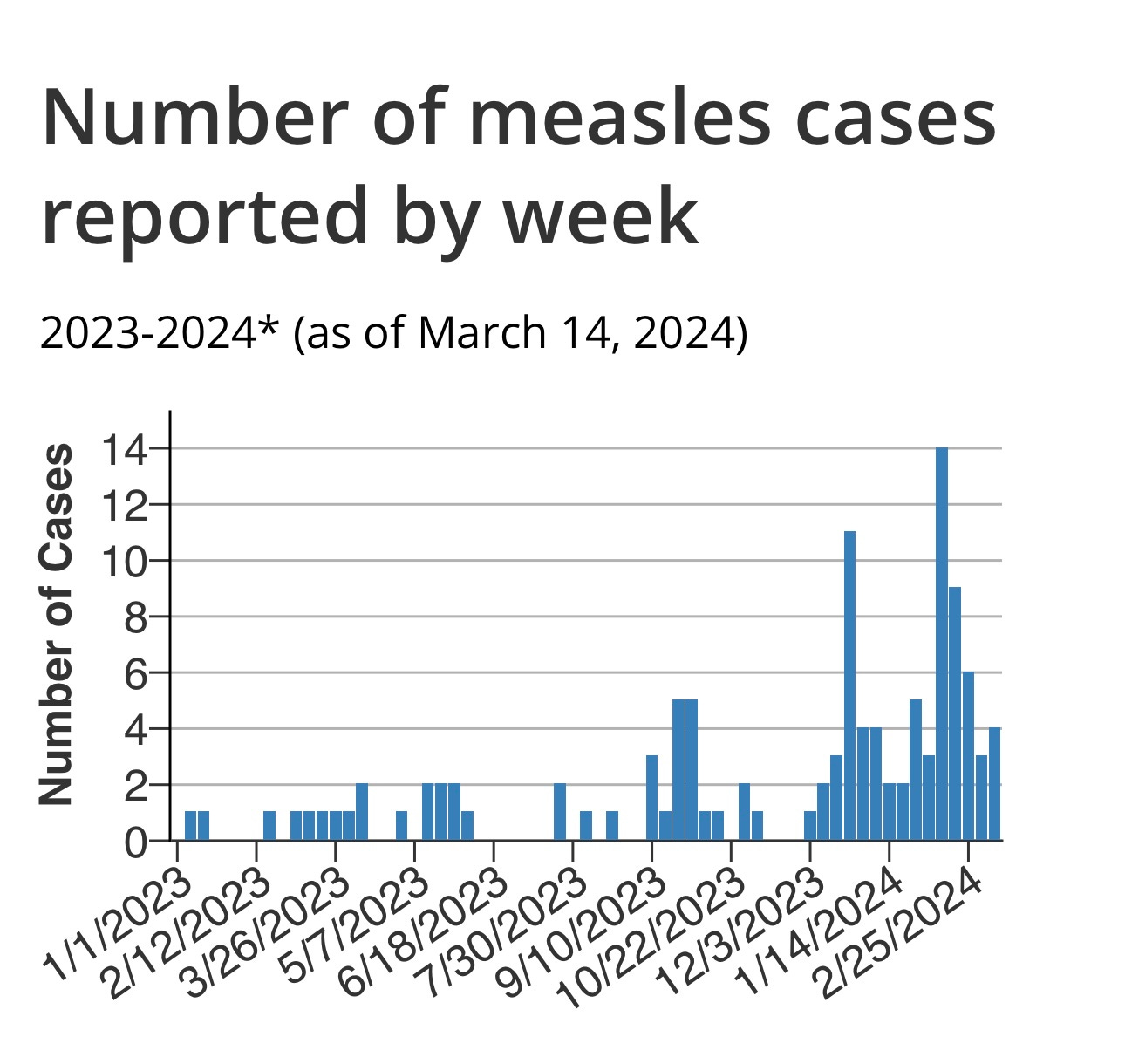Measles is making a comeback thanks to anti-vaccine misinformation
Think misinformation is harmless? Think again.
Measles is on the rise in the U.S., with 60 confirmed cases reported across 17 states, and outbreaks still ongoing in localities such as Florida and Illinois. The number of measles cases in the first 2.5 months of 2024 has already surpassed the total number of cases reported during the entirety of 2023, sparking fears that a bigger outbreak could be on the horizon.
These trends are driven by a multitude of factors, but in recent years, anti-vaccine misinformation has become a leading contributor to vaccine refusal and declining vaccination rates.
So far this year, cases have been reported in Arizona, California (where 300+ people were exposed to the patient), Georgia, Florida (where an outbreak spread through schools), Louisiana (which just reported its first cases in six years), Illinois, Indiana (which just reported its first measles case in five years), Virginia, Maryland, Michigan, Minnesota, Missouri (where officials are reporting at least one hospitalization and potential exposure of hundreds at an airport), New Jersey, New York, Ohio, Pennsylvania (where an outbreak happened after an infected child was sent to daycare), Virginia, and Washington.
If the current trend continues, the CDC projects that we’ll see a 175% increase in measles cases this year.
In 2000, measles was declared eliminated in the US, thanks to widespread uptake of the vaccine. However, the virus continues to be reintroduced by international travelers, and in recent years, the growth of the anti-vaccine movement and spread of vaccine misinformation have contributed to the resurgence of localized measles outbreaks.
Despite what anti-vaccine advocates may claim, measles is actually quite serious and leads to hospitalization for 1 in 5 people infected with the virus. About 1-3 of every 1,000 persons with measles will die from the illness, even with access to the best medical care.
Currently, at least 8,500 school districts nationwide are at risk of outbreaks due to declining measles vaccination rates. According to the CDC, vaccination coverage must stay above 95% to prevent the highly contagious virus from spreading.
Even small drops in vaccination coverage can have devastating consequences due to the impact on herd immunity. Last year, the percentage of children with measles vaccination coverage dropped about 2 percentage points nationwide, with some states like Hawaii experiencing drops of nearly 8 percentage points.
Overall, 3% of kindergartners nationwide had an exemption from one or more mandatory vaccines during the 2022-2023 school year, reaching the highest level ever recorded, after 40 states passed new laws expanding exemptions for routine childhood immunizations. Non-medical exemptions make up more than 90% of all exemptions. Idaho has by far the highest rate of vaccine exemptions (12%) among kindergarten children, followed by Oregon, Utah, Wisconsin, Arizona, Hawaii, Nevada, and Michigan.
According to data from the Kaiser Family Foundation, 35% of Americans oppose mandatory vaccination for public school children, a significant increase from 23% in 2019. Much of this is linked to the controversy and spread of misinformation about the COVID vaccine, which has spilled over into the discourse about childhood vaccinations.
Globally, confidence in childhood vaccinations dropped by as much as 44% in some countries, with 67 million children missing out on one or more critical immunizations between 2019 and 2021. This comes amid the largest backslide in childhood vaccination rates in three decades.
In many ways, vaccination is a victim of its own success. Widespread adoption of vaccines over the past sixty years has led to the disappearance of many common childhood illnesses, meaning that most people of childbearing age today were not alive at a time when diseases like measles, whooping cough, and polio were common ailments. Let’s hope it won’t take a nationwide resurgence of preventable diseases — and the needless suffering and death of children that would accompany it — to remind people why vaccination remains one of the most important public health advances in world history.



